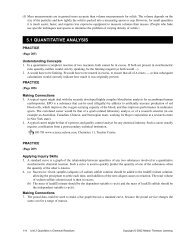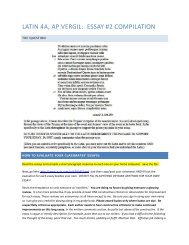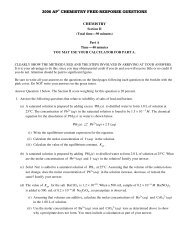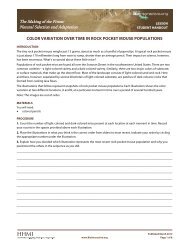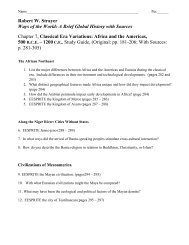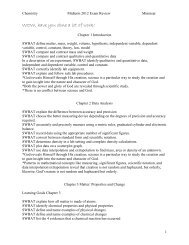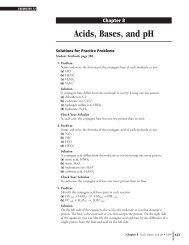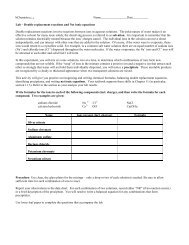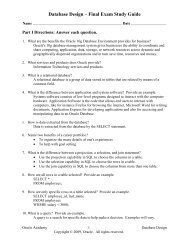ORPHEUS AND EURYDICE - Quia
ORPHEUS AND EURYDICE - Quia
ORPHEUS AND EURYDICE - Quia
You also want an ePaper? Increase the reach of your titles
YUMPU automatically turns print PDFs into web optimized ePapers that Google loves.
<strong>ORPHEUS</strong> <strong>AND</strong> <strong>EURYDICE</strong><br />
Metamorphoses X.1-77<br />
The tragic story of the singer Orpheus (son of the Muse Calliope) and his<br />
beloved wife Eurydice, twice lost to death, is certainly one of the best known of<br />
ancient myths. Ovid's version is told, with remarkable (and intentionally illproportioned)<br />
economy, in fewer than 80 lines: On the couple's wedding day, the<br />
hero's new bride falls dead, stricken by the bite of a serpent. Having mourned<br />
Eurydice "sufficiently" and "so that he might not neglect to try the shades of<br />
Hell" -two of several deliberately curious details in the narrative-Orpheus<br />
descends into the Underworld and appeals to Persephone and the prince of<br />
darkness to allow his wife's return to the land of the living. With a rambling,<br />
highly rhetorical lyric that takes up nearly a third of the entire tale, the minstrel,<br />
who could charm animals and even stones with his song, literally stupefies all the<br />
bloodless souls of Hades (the Danaids leave off carrying their urns and Sisyphus<br />
sits down on his rock!) and instantly compels Hades' king and queen to his will,<br />
on the condition, however, that in leading Eurydice out of their realm he should<br />
never look back at her face. Just as they reach the edge of upper earth, of<br />
course, Orpheus does steal a fateful backward glance, only to see Eurydice at<br />
that moment, "dying again," tumbling downward and for eternity into the abyss.<br />
Briefly stupefied himself at the calamity, and then thwarted in his attempt at a<br />
second crossing of the river Styx, Orpheus retreats to the mountains of his<br />
homeland Thrace (despite the implications of an earlier pledge to join his wife<br />
in death should he fail in his mission).<br />
The story was in antiquity widely known from several versions, in particular<br />
from Vergil's Georgics (IV.452-546), and modern readers ought to consider<br />
carefully the differences between the two accounts, just as Ovid expected his<br />
contemporary audience to do. Suffice it here to say that Vergil's protagonist is<br />
at once more heroic and more sympathetic, his Eurydice far more dimensional<br />
(in Ovid's telling, the hapless bride is a mere sketch of a character and has but<br />
a single word to say, Vale), his rendering of Hell more fearful (and never<br />
verging on the comic, like Sisyphus perched on his stone). In Vergil's concluding<br />
scene, Orpheus' head, torn from his shoulders by a throng of crazed Bacchantes<br />
and hurled into the Hebrus river, cried out the name of his beloved Eurydice<br />
again and again as it floated downstream, a pitiable lament re-echoed by the<br />
river's banks. In Ovid's anti-epic version, a clever undercutting of the traditional<br />
tale, Eurydice, "sufficiently mourned," seems insufficiently loved, and his<br />
magniloquent Orpheus seems closer in his ineptitudes to Daphne's blustering<br />
Apollo than to Thisbe's Pyramus, whose actions speak, as properly they should,<br />
far louder than his words.<br />
!iF;<br />
\<br />
, -,<br />
,I,<br />
/.<br />
II.<br />
<strong>ORPHEUS</strong><strong>AND</strong> <strong>EURYDICE</strong>t 57<br />
Like the other transformations in this book, Eurydice's ill-fated marriage to<br />
the mystical lord of song and her tragic metamorphosis from dead to dead again<br />
have fascinated musicians, poets, and artists over the centuries. The story has<br />
inspired verse by Wordsworth and Shelley (both of whom looked to Vergil's<br />
account), Swinburne and Robert Browning, Rilke, D.H. Lawrence, Robert<br />
Lowell, and James Dickey; operas by Jacopo Peri (our earliest surviving opera,<br />
first performed in 1600) and Claudio Monteverdi (1607), by Gluck and Haydn<br />
and Mozart in the 18th century, by Offenbach in the 19th, and even the modern<br />
Japanese opera, Hiroshima no Orfe (Orpheus in Hiroshima), by Yasushi<br />
Akutagawa (1967); other musical compositions by Schubert and Liszt and<br />
Stravinsky; numerous dramatizations, includingHenry Fielding's farce, Eurydice,<br />
or, The Devil Henpeck'd (1737), Jean Anouilh's Eurydice (1941), and Tennessee<br />
Williams' Orpheus Descending (1955); paintings by Titian, Poussin, Rubens, and<br />
Feuerbach (seen below); sculpture by Bandinelli and Rodin; and a wide range of<br />
other artistic productions, among them three choreographed dances by Isadora<br />
Duncan and the films Orphee (1949) and Le Testament d'Orphee (1959) by Jean<br />
Cocteau and Marcel Camus' Black Orpheus (1959).<br />
"Orpheus and Eurydice"<br />
Anselm Feuerbach, 1869<br />
Osterreichische Galerie<br />
Vienna
58 1ftII OVID:LOVE<strong>AND</strong>TRANSFORMATION<br />
1 lode: BookIX hadendedwith the weddingof Iphis andIantheon the island<br />
of Crete; the marriagegod Hymenaeus(line 2) now makes his way from<br />
that eventto the weddingof OrpheusandEurydice.<br />
immensus, -a, -om, boundless, vast (with aethera 2).<br />
croceus, -a, -om, of saffron;saffron-colored,yellow (the color worn by<br />
bridesin Romanweddings).<br />
crocee> ... amictu: the words surround velatus just as the cloak itself<br />
was wrapped around the god.<br />
velO, -are, -avi, -atus, to cover, clothe (with Hymenaeus 2).<br />
2 aether, aetheris, acc. aethera, n., the upper regions of space, heaven.<br />
digredior, digredi, digressurus, to go away, depart.<br />
3<br />
Cicones, Ciconom, m. pl., the Cicones (a tribe of southern Thrace).<br />
Hymenaeus, -I, m., the Greek wedding refrain,' the god of marriage (cf.<br />
Hymen 1.480).<br />
*ora, -ae, f., shore, coast.<br />
*tendo, tendere, tetendi, tentus, to extend, stretch forth; to proceed.<br />
Orpheus, -a, -om, of or belonging to Orpheus.<br />
Orphea . . . voce: Ovid uses the adjective instead of Orpheus'<br />
order to focus on the man's most remarkable attribute, his<br />
name, in<br />
mesmerizing voice (which in this case fails to achieve the effect he<br />
desired); cf. Rhodopeius .. . yates (11-12).<br />
nequiquam: because, while Hymenaeus did appear, his epiphany proved<br />
most unpropitious.<br />
4 iIIe: Hymenaeus.<br />
nee . . . / nee . . . nee (5): an effective polysyndeton.<br />
sollemnis, -is, -e, ceremonial, ritual; traditional.<br />
sollemnia verba: i.e., the wedding hymn.<br />
5<br />
6<br />
7<br />
8<br />
nee . . . ielix: a heavy spondaic line, with conflict of ictus and accent.<br />
*- -. . .<br />
omen, omlDlS, n., omen, augury, slgn.<br />
quoque quam: note the alliteration and cf. iisque/-osque in the next line.<br />
lacrimosus, -a, -om, tearful; causing tears.<br />
lacrimoso. . . fiimo: the repeated o's are perhaps meant as a mournful<br />
sound effect.<br />
stridulus, -a, -om, shrill, high-pitched (here, hissing or sputtering, a sound<br />
furthersuggestedby the repeateds's in 6-7).<br />
*iisque, adv., all the way to or from,' continuously.<br />
nullas . . . ignes: i.e., the torch was sputtering and smoking (irritating the<br />
eyes of the celebrants) and never thoroughly caught fire, even as it was<br />
waved back and forth to ignite the sparks.<br />
motus, -us, m., movement (here, even with shaking).<br />
exitus, -iis, m., departure, exit,' outcome.<br />
Exitus. . . gravior: sc. fuit; brevity, ellipsis, and the quick dactyls add<br />
point to the sententia.<br />
*auspicium, -i, n., omen, augury (here abl. of comparison).<br />
Nam . . . vagiitur (9): there are some striking sound effects, including<br />
j<br />
I<br />
I~<br />
5<br />
<strong>ORPHEUS</strong><strong>AND</strong><strong>EURYDICE</strong>1ftII 59<br />
lnde per immensum, eroeeo velatus amietii,<br />
aethera dIgreditur Cieonumque Hymenaeus ad odis<br />
tendit, et Orphea nequlquam voce voeatur.<br />
Adfuit ille quidem, sed nee sollemnia verba<br />
nee laetOsvultiis nee telIx attulit omen;<br />
fax quoque, quam tenuit, laerimoso strIdula fiimo<br />
usque fuit nullosque invenit motibus ignes.<br />
Exitus auspicio gravior. Nam nupta per herbas<br />
dum nova, Naiadum turba eomitata, vagatur,<br />
DiscussionQuestions<br />
1. How is the positioningof immensum. . . / aethera (1-2) appropriate to the<br />
scenedescribed?<br />
2.<br />
3.<br />
4.<br />
5.<br />
6.<br />
9<br />
How doesmeterreinforcemeaningin verses2-3? What is especially<br />
effective in the shift of rhythm in 3?<br />
Comment on the wordplay in voce vocatur (3).<br />
What are the multiple effects of the meter, the polysyndeton, and the<br />
positioning of the adjectives in 4-5?<br />
How does the ominous scene conjured up by lacrimoso ...fiimo (6)<br />
foreshadow the events that follow?<br />
Notice that Eurydice is at first (like Orpheus) not named, but only referred to<br />
as nupta ... nova (8-9); knowing that Ovid's audience was already well<br />
familiar with the story, what do you see as the effect?<br />
alliteration of nand t, the assonance of per/her-, dum/-dum, and the<br />
series of a's, especially in comitata vagiitur.<br />
nupta, -ae, f., a married woman, wife; with nova, a bride.<br />
dum: as often, the conjunction (which we should expect to precede nupta) is<br />
delayed; cf. the position of postquam (11).<br />
Niiias, Niiiadis, f., a Naiad (a river nymph).<br />
vagor, vagiiri, vagiitus sum, to wander,roam.
60 tIIIr OVID:lOVE<strong>AND</strong>TRANSFORMATION<br />
10 occido, occidere, occidi, occasiirus, to fall, collapse; to die.<br />
talus, -I, m., ankle-bone, ankle.<br />
in talum ... recepto: lit., with a snake's tooth received into her ankle;<br />
even in Latin the circumlocution is rather odd, as are other aspects of<br />
the narrative.<br />
dens, dentis, m., tooth, fang (note the assonance in serpentis dente).<br />
11 Quam: = Eam, object of deflevit (12); Eurydice, like Orpheus, is still not<br />
named (their names are delayed to verses 31 and 64, respectively). Note<br />
the internal rhyme Quam. . . -ras (at the caesura) -quam. . . -ras.<br />
satis: a curious modifier (did Orpheus mourn Eurydice just "enough"?), one<br />
of several elements in the narrative which Ovid deliberately introduces to<br />
undercut, and even burlesque, Orpheus' heroic image.<br />
*superus, -a, -um, above, upper.<br />
ad superas . . . auras: freely, in the air above, i.e., in the upper world;<br />
the alliteration of s in this verse (seven times) may onomatopoetically<br />
suggest the swirling of the winds on earth, in opposition to the stillness<br />
of the Underworld. Cf. supera . . . ora (26).<br />
*Rhodopeius, -a, -um, of Mt. Rhodope (in Thrace, Orpheus' homeland).<br />
Rhodopeius. . . yates (12): for the epic circumlocution cf. 50 below.<br />
12 defloo, deflere, deflevi, defletus, to weep for, mourn.<br />
*vates, vatis, m., prophet; bard, poet (the word suggests divine inspiration,<br />
aptly of Orpheus, whose songs had mystical effect; cf. Am. III. 15.1<br />
below).<br />
ne non temptaret: that he might not fail to try; a slightly odd double<br />
negative formulation (see on verse 25).<br />
et: = etiam, with umbras, the antithesis of auras (11).<br />
13 Styx, Stygis, acc. Styga, f., the Styx (principal river of the Underworld) or,<br />
by metonymy, the Underworld.<br />
Taenarius, -a, -um, of Taenarus (a promontory in the southern Peloponnese,<br />
legendary site of a cave leading into Hades).<br />
Taenaria. . . porta: abl. of route (common with words like porta,<br />
terra, and via).<br />
14 leves populOs: here, thin or even weightless tribes, i.e., ghosts.<br />
*simulacrum, -I, n., likeness,' image, statue; phantom, ghost.<br />
simulacra. . . fiincta sepulcro: phantoms of the dead (lit., ghosts that<br />
have suffered burial).<br />
*fungor, fungi, functus sum + abl., to perform; to experience, suffer (with<br />
morte and similar words, to die).<br />
15 Persephone, Persephones, acc. Persephonen, f., Persephone or Proserpina<br />
(daughter of Zeus and Demeter, wife of Pluto, and queen of the<br />
Underworld).<br />
Persephonen . . . dominum (16): sc. ad with each noun.<br />
adiit: the final i, normally short, is here lengthened under the ictus and<br />
before the caesura (diastole).<br />
inamoenus, -a, -um, unpleasant, unlovely.<br />
r I<br />
If<br />
I I<br />
I<br />
It<br />
I<br />
{ I<br />
10<br />
15<br />
<strong>ORPHEUS</strong><strong>AND</strong><strong>EURYDICE</strong>tIIIr 61<br />
occidit in talum serpentis dente recepto.<br />
Quam satis ad superas postquam Rhodopeius auras<br />
deflevit Yates, ne non temptaret et umbras,<br />
ad Styga Taenaria est ausus descendere porta,<br />
perque leves populOssimulacraque ffincta sepulcro<br />
Persephonen adiIt inamoenaque regna tenentem<br />
umbrarum dominum, pulsIsque ad carmina nervIs<br />
DiscussionQuestions<br />
1. What effect does Ovid achieve through the enjambement of occidit (10) and<br />
the shift of meter following? Comment too on the line's striking c/d/t<br />
alliteration; are these sounds appropriate to the context?<br />
2.<br />
What is your response to Ovid's quick narration of Eurydice's death and<br />
Orpheus' mourning before descending into the underworld (10-12)? Is the<br />
narrative too abbreviated and the transition in 11 deliberately abrupt, and, if<br />
so, what is the poet's intent?<br />
3. How might the negative phrasing of the purpose clause in 12 serve to<br />
undercut Orpheus' heroic image?<br />
4.<br />
How is the meter in 12 suited to the scene shift from II? Comment on other<br />
sound effects in the line.<br />
5. By comparisonwith Aeneas'descentinto Hadesin AeneidVI, Orpheus'<br />
journey seems to have been accomplished with lightning-fast speed; how does<br />
the meter in 14-15 help convey this impression?<br />
16<br />
inamoenaque . . . dominum (16): an epic periphrasis for Pluto, lord of<br />
the dead.<br />
umbrarum dominum: a highly effective enjambement, punctuated by<br />
caesura and intensified by the roaring r's and the foreboding assonance of<br />
um-I-um/-um (under the ictus in each of the first three feet).<br />
*pello, pellere, pepuli, pulsus, to beat against, strike,' to drive away, banish,<br />
expel.<br />
pulsisque ad carmina nervis: with the strings (of his lyre) strummed to<br />
accompany his song; Orpheus does not merely address the prince of<br />
darkness and his bride, but tries to charm them through the magic of<br />
his lyrics. Cf. nervosque ad verba moventem (40), which precisely<br />
balances the phrase here and with it frames the entire song (17-39).
62 Jmr OVID:LOVE<strong>AND</strong>TRANSFORMATION<br />
17 sic ait: the enjambement and diaeresis effectively introduce Orpheus' lengthy<br />
song.<br />
niimina: voc., with the gen. phrase positi . . . mundi; note the soundplay<br />
with carmina (identically positioned in 16) and mundi.<br />
18<br />
19<br />
20<br />
21<br />
22<br />
23<br />
24<br />
mundus, -i, m., world, universe.<br />
reccido, reccidere, reccidi, recciisurus, to fall back, sink back (here pres.<br />
tense).<br />
*quisquis, quidquid, indefinite reI. pron., any who, whoever, whatever.<br />
quidquid . . . creamur: "we," the subject of reccidimus, is the<br />
antecedent; the n. sing. pron. is used here for a generalizing effect,<br />
whichever of us are created mortal.<br />
mortalis, -is, -e, subject to death, mortal.<br />
creO, -are, -avi, -atus, to beget, create.<br />
si licet et . . . sinitis (20): the protasis of a simple fact condition, with<br />
descendi (21) the verb of the apodosis.<br />
*falsus, -a, -om, untrue, false; misleading, deceptive.<br />
falsi. . . oris: the beguiling singer here promises to utter only the truth.<br />
(whether he does or not is a matter of interpretation).<br />
positis: = depositis, set aside; the implication is that he sometimes does, or<br />
at least can, speak evasively or obscurely.<br />
ambages, -um, f. pl., a circuitous path; long-winded, obscure, or evasive<br />
speech.<br />
*opacus, -a, -om, shaded; shadowy, dark, dim.<br />
Tartara, -orom, n. pl., Tartarus (the Underworld).<br />
uti: = ut.<br />
villiisus, -a, -um, shaggy, hairy.<br />
villiisa . . . I terna . . . guttura (22): note the elaborate interlocked<br />
word order, producing with Medusaei . . . monstri a brilliant golden<br />
line.<br />
colubra, -ae, f., serpent, snake (used especially of the "hair" of monsters, as<br />
here with villosa, bristling with serpents).<br />
terni, -ae, -a, pI. adj., three (each), three at a time, three in succession.<br />
Medusaeus, -a, -um, of Medusa (the Gorgon whose hair consisted of living<br />
serpents); (here) resembling Medusa, Medusa-like.<br />
Medusaei . ..monstri: Cerberus, the three-headed watchdog of the<br />
Underworld, was born of the snake-demon Echidna, a sister of<br />
Medusa; like Medusa, he had snaky locks and was so hideous that a<br />
single glance at him could turn a man to stone (cf. 65-66).<br />
vincio, vincire, vinxi, vinctus, to bind, tie up.<br />
guttur, gutturis, n., throat.<br />
monstrum, -I, n., omen, portent; monster.<br />
causa. . . coniunx: an abrupt formulation; note the harsh alliteration of c,<br />
continued in calcata.<br />
calco, -are, -avi, -atus, to trample; to tread, step on.<br />
venenum, -I, n., a potent herb; poison, venom.<br />
vipera, -ae, f., viper, serpent.<br />
20<br />
25<br />
<strong>ORPHEUS</strong><strong>AND</strong><strong>EURYDICE</strong>Jmr 63<br />
sIc ait: "0 posit! sub terra numina mundI,<br />
in quem reccidimus, quidquid morrnle creamur,<br />
sI licet et falsI positIs ambagibus oris<br />
vera loquI sinitis, non huc, ut opacaviderem<br />
Tartara, descendI, nec utI villosa colubrIs<br />
terna MedusaeI vincIrem guttura monstrI;<br />
causaviae est coniunx, in quam calcata venenum<br />
vIpera difffidit crescentesqueabstulit annos.<br />
Possepat! voluI nec me temprnssenegabo;<br />
DiscussionQuestions<br />
1. In what respects does the expression falsi positis ambagibus oris I vera<br />
loqui (19-20) seem redundant? What might Ovid's purpose be in having<br />
Orpheus speak this way?<br />
2.<br />
3.<br />
25<br />
What is the point of having Orpheus mention two purposes that did not<br />
motivate his descent into the underworld (20-22)?<br />
How is the intricate int~rweaving of the three adjectives and three nouns in<br />
21-22 (villiisa . . . monstri) neatly suited to Ovid's depiction of the<br />
hellhound Cerberus?<br />
diffundo, diffundere, diffudi, diffiisus, to pour widely; to pour into,<br />
diffuse.<br />
crescentes annOs: her budding years (we might say, in the bloom of youth);<br />
cf. iiistos . . . annos (36).<br />
Posse. . . temptasse: note the striking pIt alliteration and the assonance of<br />
-ossel-asse.<br />
pati: complementary infin. with posse, to endure (Le., his loss).<br />
nee me temptasse negabO: nor shall I deny that I tried (to endure). Both the<br />
verb (temptasse = temptavisse) and the curious double negative recall ne<br />
non temptaret et umbras (12); each phrase follows a reference to the<br />
serpent's strike and Orpheus' mourning.
64 ~ OVID:LOVE<strong>AND</strong>TRANSFORMATION<br />
26 vicit Amor: sc. me; asyndeton (we expect sed or autem) and the very<br />
brevity of the sentence underscore Orpheus' point (cf. the expanded vOs<br />
quoque iiinxit Amor 29).<br />
Supera . . . ora: cf. superas . . . auras (11).<br />
27 an sit: sc. bene notos; the series of monosyllables, and the consequent<br />
jerkiness of the dactylic rhythm, both preceding and following dubito, help<br />
suggest Orpheus' initial hesitancy (or the hesitancy he feigns).<br />
et: = etiam; the anaphora of et hie strengthens the equation Orpheus makes<br />
between Love's two victories in 26 and 29.<br />
auguror, augurari, auguratus sum, to foretell by augury; to intuit, sense,<br />
28<br />
surmise.<br />
esse: i.e., eum (Amorem) esse notum, indirect statement with auguror.<br />
*fama, -ae, f., news, report; tradition, story.<br />
veteris . . . rapinae: i.e., Pluto's rape of Persephone (which Ovid himself<br />
had included in Met. V, in a tale narrated by Orpheus' own mother, the<br />
Muse Calliope).<br />
mentiOr, mentiri, mentitos sum, to lie; to invent, fabricate.<br />
29 Per: with oaths, by.<br />
Per. . . loea . . . / per Chaos (30): anaphora and asyndeton lend<br />
intensity to Orpheus' oath, as do the strong epithets (plena timoris,<br />
ingens, vasti-these last two effectively juxtaposed). Cf. in loea plena<br />
30<br />
metUs (IV.111 above).<br />
ego: in prose this word (subject of oro 31) would either precede or follow the<br />
prepositional phrases; but in oaths Ovid favors this arrangement, which<br />
emphasizes the subject.<br />
Chaos, -I, n., Chaos (the formless state of the universe before creation); the<br />
Underworld.<br />
vastos, -a, -um, desolate, lifeless; huge, immense.<br />
silentia: poetic pI.; cf. 53 below.<br />
31 *Eurydiee, Eurydices, acc. Eurydieen, f., Eurydice (a Thracian nymph, wife<br />
of Orpheus-for the delay of her name to this late point in the narrative,<br />
see above on quam 11, and for the Greek case endings cf. Daphne and<br />
Thisbe).<br />
properata . . . rata: premature death; note the assonance.<br />
retexo, retexere, retexui, retextus, to unweave (Ovid has in mind the myth<br />
of the Fates, or Parcae, weaving the tapestry of a person's life from birth<br />
to death).<br />
*fatum, -I, n., prophecy; destiny, fate; Fate (as a deity); doom, death (often<br />
34<br />
pI. for sing.).<br />
Tendimos ... vosque: note the hiie/haec anaphora, the parallel placement<br />
of omnes and ultima, and the emphatic vosque (and cf. vOs29, vobis 32,<br />
vestri 37).<br />
35 longissima regna: poetic pI., the most enduring dominion over (with the<br />
objective gen. generis).<br />
tenetis: note the wordplay with this verb at the end of the sentence and the<br />
assonant tendimus at the beginning.<br />
,t<br />
li<br />
I<br />
I<br />
I"<br />
30<br />
35<br />
<strong>ORPHEUS</strong><strong>AND</strong><strong>EURYDICE</strong>Jftb: 65<br />
vIcit Arnor. Supera deus hie bene notus in ora est;<br />
an sit et hIe, dubito. Sed et hIe tamen auguror esse,<br />
ffimaque sI veteris non est mentIta rapInae,<br />
vos quoque iUnxitArnor. Per ego haec loca plena timoris,<br />
per Chaos hoc ingens vastIque silentia regnI,<br />
Eurydices, oro, properata retexite tata!<br />
Omnia debentur vobIs, paulumque moratI<br />
serius aut citius sedem properamus ad unam.<br />
Tendimus hue omnes, haec est domus ultima, vosque<br />
humanI generis longissima regna tenetis.<br />
Haec quoque, cum iUstosmamra peregerit annos,<br />
DiscussionQuestions<br />
1. In view of its context, what do you suppose is the intended effect of the<br />
poetic plural silentia (30)? I<br />
2.<br />
3.<br />
Some readers take properata retexite fata (31) to mean reweave Eurydice's<br />
destiny, too swiftly ended rather than unweave her premature death; which<br />
makes better sense in this context and why?<br />
Comment on the placement of omnia and iinam (32-33); what is the<br />
intended effect and how is the idea continued in the next verse?<br />
36 Haee: i.e., Eurydice, but the word continues the anaphora with hiie and haec<br />
in 34.<br />
iiistus, -a, -um, lawful, legitimate; rightful, proper, deserved.<br />
matiirus, -a, -um, ripe; advanced in age.<br />
*perago, peragere, peregi, peractus, to chase; to complete; to go through<br />
(space or time); to live out, complete (a period of time).
66 ~ OVID:LOVE<strong>AND</strong>TRANSFORMATION<br />
37 iUris . . . vestri: under your authority (a variety of possessive gen.).<br />
38<br />
*miinus, miineris, n., a required task; tribute, offering (to a deity); gift (with<br />
pro, as a gift); favor, service.<br />
*iisus, -iis, m., use, employment; the right to use or enjoy (especially with<br />
reference to property owned by another); potential for use, utility;<br />
marriage (one type of Roman civil marriage, which became binding<br />
following a full year of cohabitation).<br />
Quod: here, but.<br />
*venia, -ae, f.,favor, kindness, blessing (especially in a religious sense);<br />
39<br />
forgiveness, pardon; reprieve, remission.<br />
certum est / . . . mihi (39): I am determined (lit., it is a certainty for me) +<br />
infin.; mihi is delayed to balance coniuge.<br />
nolle: essentially equivalent to non here, but with greater force.<br />
leto gaudete duorum: the t/d alliteration, the assonance of let-/-det-, the<br />
accented o's, and the abrupt imperative add a harsh, melancholy tone to the<br />
song's close.<br />
40<br />
41<br />
42<br />
43<br />
Talia . . . moventem: this line corresponds precisely to pulsisque . . . / sic<br />
ait (16-17) and with it providesa chiasticframefor Orpheus' song;the<br />
internal rhyme in dicentem . . . moventem adds an aptly musical sound<br />
effect. With the participles sc. Orpheum, object of flebant (41).<br />
exsanguis, -is, -e, bloodless; pale; lifeless.<br />
*fleo, flere, flevi, fletus, to weep, cry; to weep for, lament.<br />
Tantalus, -I, m., Tantalus (a Lydian king, son of Zeus and father of Pelops).<br />
Tantalus. . . refugam (42): like the others named in the next few lines<br />
(and described by Ovid earlier in Met. IV), Tantalus had committed a<br />
crime that earned him eternal torment in Hades. Since Tantalus'<br />
offense was culinary (he had butchered his son and served him to the<br />
gods in a stew to test their omniscience), he was cursed with perpetual<br />
hunger and thirst, standing beneath a tree whose fruits remained just<br />
beyond his reach and in a stream whose waters receded from his lips<br />
whenever he sought to drink. Here, stunned by Orpheus' song, each of<br />
these shades momentarily ceases from its labors.<br />
captavit: here, with nee Tantalus, and Tantalus did not try to seize (or catch<br />
at).<br />
refugus, -a, -um, fleeting; receding.<br />
stupuitque Ixionis orbis: and Ixion's wheel, in amazement, ceased to turn;<br />
Orpheus' song was powerful enough to mesmerize, not only men and<br />
beasts (like the volucres in 43), but even inanimate objects.<br />
Ixion, Ixionis, m., Ixion (king of the Lapiths, who was tied to a perpetually<br />
turning wheel in Hades as punishment for his attempt to seduce Juno).<br />
*carpo, carpere, carpsi, carptus, to pluck, gather; to tear at; to travel,<br />
pursue (a path).<br />
carpsere . . . volucres: the allusion is to the giant Tityus, who, for his<br />
attempted rape of Leto, was tied down to several acres of ground in<br />
the Underworld and exposed to vultures that tore constantly at his liver<br />
(the organ thought to be the source of the libido and other passions);<br />
I<br />
40<br />
<strong>ORPHEUS</strong><strong>AND</strong><strong>EURYDICE</strong>~ 67<br />
iiiris erit vestrI-pro munere poscimus usum.<br />
Quod sI Fata negant veniam pro eoniuge, eertum est<br />
nolle redIre mihI; letO gaudeteduorum."<br />
Talia dIeentem nervosque ad verba moventem<br />
exsanguesflebant animae; nee Tantalus undam<br />
eaptavit refugam, stupuitque IxIonis orbis,<br />
nee earpsereieeur volueres, urmsque vaearunt<br />
DiscussionQuestions<br />
1. What rhetorical effect does Ovid hope to achieve by his repeated use of the<br />
second person pronoun in 29-37?<br />
2.<br />
One argument for releasing Eurydice (25-29) precedes Orpheus' oath and<br />
entreaty in 29-31, and another (32-37) follows; what are the arguments and<br />
which is stronger? How economically is the second point made, and how<br />
does this economy (or the lack of it) coincide with Orpheus' promise in<br />
positis ambagibus (19)? At what point earlier in Orpheus' speech is the<br />
second argument anticipated?<br />
3. What tone is established through the use of the words iiistos, iUris, and<br />
poscimus iisum (36-37)? What impression of Orpheus' attitude toward his<br />
spouse may this language be intended to convey?<br />
4.<br />
How does Ovid carefully position his words to accentuate the internal rhyme<br />
in 40?<br />
carpsere = carpserunt.<br />
iecur, iecoris, n., the liver.<br />
*volucris, volucris, f., a winged creature, bird.<br />
urnis . . . / Belides (44): 49 of the 50 Danaids (daughters of the Libyan king<br />
Danaus, son of king Belus), in obedience to their father, murdered their<br />
bridegroom-cousins on their wedding night and were punished in Hades by<br />
having to fill with water urns that perpetually leaked.<br />
*vaco, -are, -avi, -atus, to be empty, unfilled; to be free from, take a rest<br />
from (vacarunt = vacaverunt).
68 11ft[ OVID:LOVE<strong>AND</strong>TRANSFORMATION<br />
44 Belis, Belidos, nom. pI. Belides, f., descendants of Belus (the -is, -idos<br />
endings are a common patronymic formation), the Danaids.<br />
Sisyphus, -I, m., Sisyphus (this king of Corinth had offended both Zeus and<br />
Pluto and was condemned in Hades to push a huge stone up a hill, only to<br />
have it roll back down again each time he neared the top; the apostrophe<br />
here enlivens the narrative).<br />
*saxum, -I, n., a stone, rock, boulder.<br />
45 Tunc. . . genas (46): the clause is an indirect statement following ffima est,<br />
there is a story that or it is said that; the prose word order would be Fama<br />
est genas Eumenidum,<br />
maduisse.<br />
eannine victarum, tunc primum laerimis<br />
46<br />
47<br />
49<br />
50<br />
51<br />
Eumenis, Eumenidos, gen. pI. Eumenidum, f. (usually pl.), one of the<br />
Eumenides or Furies (goddesses of vengeance, who were generally severe<br />
and implacable).<br />
madeseo, madeseere, madui, to become wet.<br />
gena, -ae, f., the side of theface, cheek; pI., the area around the eyes, the<br />
eyes.<br />
regius, -a, -um, of the king, royal.<br />
oranti: sc. Orpheo, indirect object with negare, to say no to<br />
(complementary infin. with sustinet).<br />
qui regit ima: i.e., Pluto, subject (with regia eoniUnx = Persephone) of<br />
sustinet.<br />
inter. . . tardo: the anastrophe and enjambement of inter (which in prose<br />
would precede its object umbras), with the off-beat caesura and et<br />
following, the three spondees and conflict of ictus and accent in ineessit<br />
passu, and the harsh alliteration of t, all sound out the slow, limping<br />
cadence of Eurydice's gait.<br />
ineessit: this verb is often used of the slow, orderly movement of a person of<br />
stately, even majestic bearing; there is perhaps that nuance here: Eurydice<br />
steps slowly, serenely, not just because of her wound, but also as befits the<br />
ghostly spectre of a river nymph.<br />
de vulnere: Eurydice still feels the effects of the snakebite because she is<br />
among the recently deceased (umbras. . . recentes 48).<br />
tardo: with passu (not vulnere), abl. of manner.<br />
Hane . . . et legem. . . aecipit:' hane = Eurydice; the zeugma (Orpheus<br />
received his wife and accepted the condition that Pluto and Persephone<br />
imposed) is perhaps meant as a further depersonalizing effect.<br />
legem: the restriction is explained in the following jussive noun clause (an<br />
indirect command).<br />
Rhodopeius . . . heros: some manuscripts have Orpheus instead of herfis,<br />
but with the epithet Rhodopeius the name is a redundancy and the reading<br />
adopted here is comparable with Rhodopeius . . . yates ( 11-12 above) and<br />
Paphius . . . heros (X.290 below).<br />
*heros, heroos, m., hero (another Greek formation).<br />
retro: i.e., back down into the Underworld; this condition may recall for<br />
readers the biblical story of Lot in Sodom and Gomorrah.<br />
I<br />
t<br />
1<br />
45<br />
50<br />
<strong>ORPHEUS</strong><strong>AND</strong><strong>EURYDICE</strong>!!lit69<br />
Belides, inque tuo sedistI, SIsyphe, saxo.<br />
Tunc prImum laerimIs vicmrum carmine flima est<br />
Eumenidum maduisse genas; nee regia eoniunx<br />
sustinet orantI nee qUIregit Ima negare,<br />
Eurydicenque vacant. Umbras erat illa reeentes<br />
inter, et ineessit passu de vulnere tardo.<br />
Hane simul et legem Rhodopeius aeeipit heros,<br />
ne fleetat retro sua lUmina, donee Avernas<br />
exierit valles, aut irrita dona furura.<br />
Carpitur aeelIvis per muta silentia trames,<br />
DiscussionQuestions<br />
1.<br />
2.<br />
What seem to you the most striking sound effects in 43-44?<br />
What is your reaction to the picture of Sisyphus presented in 44? How does<br />
this color your interpretation of the narrative's overall tone and purpose?<br />
3. What consonant sound predominates in Ovid's description of the Furies<br />
(45-46) and what is the effect?<br />
4.<br />
52<br />
53<br />
Comment on the word-picture in Umbras. . . ilia reeentes (48).<br />
*liimen, liiminis, n., light; an eye (especially pl.); vision, gaze, glance (sing.<br />
or pl.).<br />
donee, conj., until.<br />
Avernus, -a, -um, of the Underworld, infernal.<br />
valles, vallis, f., valley or, with reference to Hades, the abyss.<br />
irritus, -a, -um, nullified, void.<br />
irrita dona futura: = dona futura esse irrita, indirect statement after<br />
the implied speech word in legem.<br />
dona: pI. for sing., i.e., the gift of Eurydice's resurrection from the dead.<br />
Carpitur . . . trames: English would use an active construction, they pressed<br />
their way along the upward sloping path.<br />
aeclivis, -is, -e, inclined, sloping upwards.<br />
aeclivis . . . op8ea (54): the numerous epithets and asyndeton<br />
c~unterbalance the brevity of Ovid's narration of the trek to upper<br />
earth.<br />
mutus, -a, -um, mute, soundless, speechless.<br />
trames, tramitis, m., footpath, trail.
70 J1D[ OVID:LOVE<strong>AND</strong>TRANSFORMATION<br />
54 caligo, caliginis, f., darkness,' gloom.<br />
55<br />
56<br />
57<br />
58<br />
59<br />
*densus, -a, -urn, thick, dense; frequent.<br />
*margo, marginis, m., wall; border, edge; margin.<br />
deficio, deficere, defeci, defectus, to fail; to lose strength, collapse, faint.<br />
ne deficeret: the understood subject of the (positive) fear clause is<br />
Eurydice.<br />
ne deficeret metuens avidusque videndi: note the effective chiasmus<br />
and the soundplay in avidus ... videndi; both epithets modify the<br />
subject amans (57), the lover (Le., Orpheus).<br />
*metuo, metuere, metui, metiitus, to fear, be afraid of.<br />
avidus, -a, -um, greedy,' desirous (of), eager (for) + gen.<br />
videndi: sc. earn, Le., Eurydice.<br />
flexit amans . . . ilia relapsa est: chiasmus, with the verbs framing the line.<br />
relabor, relabi, relapsus sum, to fall or slip backward.<br />
bracchiaque . . . certans: the cacophonous alliteration of r, c/q, and t/d, the<br />
series of spondees, elisions, and conflict of ictus and accent following the<br />
opening dactyl, the anaphora and assonance in the four verbals (each<br />
describing intense or violent action), and the division of the verse by the<br />
carefully positioned participles (the first at the caesura, the second at line's<br />
end), all contribute to the "soundtrack," as Eurydice starts to slip backward<br />
into the abyss and desperately thrashes out her arms toward Orpheus.<br />
intendo, intendere, intendi, intentus, to stretch; to stretch forth, hold out.<br />
intendens . . . certaos: these participles are taken by most editors to<br />
describe Orpheus, since he is assumed to be the subject in the next<br />
verse (see on cedentes. . . auras), but 58-59 more likely refer to<br />
Eurydice for several reasons: the clauses immediately preceding and<br />
following both refer to Eurydice; the actions in 58, especially the<br />
priority given to the passive prendi, and the violent ampit in 59,<br />
seem more naturally attributed to her as she slips and falls; infelix (59)<br />
is deliberately repeated in intelix Lethaea (70), a reference to<br />
Eurydice's counterpart, not Orpheus', in the simile of 68-71; and<br />
finally, the contrast between Eurydice's valiant struggle and her<br />
husband's relative ineptitude further diminishes the hero's image, in<br />
keeping with Ovid's parodying intentions.<br />
*prendo, prendere, prendi, prensus, to grasp, seize, take hold of; to catch,<br />
capture.<br />
certo, -are, -avi, -atus, to contend, strive, struggle.<br />
cedentes . . . auras: the retreating air (of the world of the living); for aurae<br />
in this fairly common sense, cf. Met. IV.478. As Eurydice reaches out for<br />
Orpheus, she catches hold of nothing but the longed-for air of upper earth,<br />
which they had very nearly reached (55) but which now retreats from her<br />
outstretched arms as she falls backward. Most readers, comparing (among<br />
other examples) the scene in Aen. 11.791-94, where Aeneas grasps only a<br />
wisp of air as he tries to embrace Creusa's ghost, refer intelix arripit to<br />
Orpheus and auras to Eurydice's shade (a possible interpretation, but see<br />
{<br />
I<br />
I<br />
.\<br />
1<br />
j<br />
l<br />
I<br />
55<br />
60<br />
<strong>ORPHEUS</strong> <strong>AND</strong><strong>EURYDICE</strong>J1D[ 71<br />
arduus, obsefirus, ealIgine densus opaea.<br />
Nee proeul afuerant tellfiris margine summae;<br />
hie, ne deficeret metuens avidusque videndi,<br />
flexit amans oeulOs. Et protinus illa relapsa est,<br />
braeehiaque intendens, prendique et prendere eertans,<br />
nIl nisi eedentes inrelIx arripit auras;<br />
iamque iterum moriens, non est de eoniuge quiequam<br />
questa suo (quid enim nisi se quereretur amatam?),<br />
supremumque "Vale," quod iam vix auribus ille<br />
DiscussionQuestions<br />
1. What is the intendedeffect.of the chiasmusin 56?<br />
2. How are the meter,the elision, andthe chiasmusin 57 especiallyappropriate<br />
to the sense?<br />
60<br />
61<br />
62<br />
above on 58 and note also that in Aen. 11.772Creusa, not Aeneas, is<br />
described as intelix).<br />
arripiO, ampere, arripui, arreptus, to grasp, take hold of, embrace.<br />
est . . . I questa (61): Eurydice is subject.<br />
quicquam, adv., in any respect,at all.<br />
quid. . . amatam: se . . . amatam (esse) is indirect statement after the<br />
potential subjunctive quereretur, for what could she complain of except<br />
that she had been lpved. .<br />
supremum: n. acc., modifying the word vale, which as Eurydice's final<br />
utterance is object of dixit (63). Only that last fleeting word falls into a<br />
quick dactyl-the rest of the line is in an aptly spondaic and, with the<br />
series of monosyllables, halting rhythm.
72 ~ OVID:LOVE<strong>AND</strong>TRANSFORMATION<br />
63 acciperet: subjn. in a reI. clauseof characteristic,perhapswith the force of<br />
result (her cry was so quick and faint that Orpheus could barely hear it).<br />
revolvo, revolvere, revolui, revolutus, to roll back, return; pass., to fall<br />
back again (cf. reHipsa est 57-there she first slips and now she tumbles<br />
quickly backward).<br />
eodem, adv., to or into the same place (the redundancy in re- and the<br />
adverbs rursus and eOdem are deliberately emphatic-and cf. iterum 60<br />
64<br />
65<br />
66<br />
67<br />
68<br />
69<br />
and gemina 64).<br />
Non aliter stupuit . . . I quam. . . qui (65). . . I quamqui. . . (68). . .<br />
tuque (69): momentarily the hero was paralyzed with horror; the quick<br />
dactyls in 64-65 suggest how suddenly this happened. In his inability to act<br />
or speak, Orpheus is compared in this double simile with characters wh~<br />
were turned to stone in two otherwise unattested transformation tales; for<br />
non aliter quam, cf. IV. 122 above.<br />
gemina nece: abI. of cause; cf. iterum moriens (60) and gemini . . .<br />
cruoris (IV.161).<br />
Orpheus, -I, m., Orpheus (the hero is at last named; -eu- in the nom. case<br />
here is a diphthong).<br />
tria. . . I colla canis (66): the tale's second reference to Cerberus (cf. terna<br />
. . . guttura monstri 22).<br />
qui timidus: with vidit; in prose the words would follow quam. The<br />
character (whose name is unknown) apparently gazed upon Cerberus as<br />
Hercules was leading him on a chain leash to king Eurystheus and,<br />
paralyzed by fear, was turned to stone.<br />
mediO: sc. collo.<br />
catena, -ae, f., a chain; pI., chains, fetters.<br />
quem. . . prior (67): the full expression here would be quem pavor nOn<br />
reliquit, antequam natura prior reliquit; in English we would say, who<br />
did not lose his fear until he lost his original nature, i.e., as a human<br />
being.<br />
pavor, pavoris, m., sudden fear, terror.<br />
antequam or (by tmesis) ante. . . quam, conj., before.<br />
oborior, oboriri, obortus sum, to rise up, spring up.<br />
quam qui. . . I Olenos (69): i.e., aut quam Olenos, qui. . . traxit; most<br />
manuscripts read quique, but (as Anderson notes) quam qui more clearly<br />
introduces the second simile in parallel with the first (cf. quam. . . qui<br />
65). We can only deduce from the context, and roughly comparable tales,<br />
that Lethaea had offended some deity, apparently in boasting of her own<br />
beauty, and when her lover (or spouse) Olenos attemptecwo accept both the<br />
blame and the punishment in her place, the two were transformed to stone.<br />
Olenos, -I, m., Olenos (the character is otherwise unknown, but there are<br />
several Greek towns with this name-and Herodotus 4.35 mentions an<br />
early Greek named Olen who, like Orpheus, was a minstrel and composer<br />
of hymns).<br />
nocens: here, guilty; note the assonance in Olenos esse nocens.<br />
tuque: with quam (68), i.e., than Olenos . . . and you, oh Lethaea; for the<br />
~<br />
\l<br />
~<br />
I<br />
~<br />
~<br />
r.<br />
t<br />
t<br />
1-<br />
65<br />
70<br />
<strong>ORPHEUS</strong><strong>AND</strong><strong>EURYDICE</strong>1ft73<br />
acciperet, dIxit, revolfitaque riirsus eodem est.<br />
Non aliter stupuit gemina nece coniugis Orpheus,<br />
quam tria qUItimidus, mediOportante catenas,<br />
colla canis vIdit, quem non pavor ante relIquit,<br />
quam natUraprior, saxo per corpus oborto;<br />
quam qUIin se crImen traxit voluitque viderI<br />
Olenos esse nocens, tUque, 0 confisa figurae<br />
InrelIx Lethaea mae, iUnctissimaquondam<br />
pectora, nunc lapides, quos umida sustinet Ide.<br />
DiscussionQuestion<br />
1.<br />
2.<br />
70<br />
71<br />
Contrast the meter of 63 with that of 62; in what way is the shift appropriate?<br />
.<br />
What are the several points of correspondence between the circumstances of<br />
Orpheus and Eurydice and those of the characters in the two similes (64-71)?<br />
Are the similes an effective part of the narrative, or do you find them unduly<br />
digressive?-defend your response.<br />
dramatic apostrophe, cf. Sisyphe (44).<br />
confido, confidere, confidi, conilSus + dat., to trust in, have confidence in,<br />
be sure of.<br />
confisa figiirae . . . tuae: so self-assured in your beauty; note the<br />
alliteration with infelix.<br />
intelix Lethaea: enjambement underscores the epithet and draws our attention<br />
back to infelix (Eurydice) in 59; both women were young (presumably) and<br />
beautiful, and had lovers who hoped to rescue them from death.<br />
Lethaea, -ae, f., Lethaea (the character is not otherwise known, but the<br />
name, like the adj. Uthaeus, -a, -um, is doubtless meant to recall Lethe,<br />
the River of Forgetfulness in the Underworld, and all of its dark, infernal<br />
associations) .<br />
iunctissima quondam I pectora, nunc lapides (71): both phrases, linked by<br />
the antithetical then/now adverbs (and the iiinc-/nunc assonance), are in<br />
apposition with Olenos and Lethaea.<br />
umidus, -a, -um, wet, moist; rainy.<br />
sustinet: here, simply holds (i.e., the rocks, boulders perhaps, were situated<br />
on the mountain).<br />
ide, Ides, f., Mt. Ida (there were mountains of this name in both Crete and<br />
Troy-probably Ovid means the latter, site of the judgment of Paris and<br />
described by Horace, Carm. III.20.16, as aquOsa).
74 Jmr OVID:LOVE<strong>AND</strong>TRANSFORMATION<br />
72 Orantem . . . volentem: sc. eum (Orpheus); the participles, both objects of<br />
arcuerat (73) and both to be taken with the adv. friistra, effectively frame<br />
73<br />
74<br />
75<br />
76<br />
77<br />
the line.<br />
portitor, portitoris, m., tollkeeper (one who collects import or export taxes);<br />
as applied to Charon (who collected pennies from the tongues of the dead<br />
before allowing them to cross over the Styx into Hades), ferryman.<br />
arceO, arcere, arcui, to contain, restrain; to keep away, drive back.<br />
Septem . . . diebus: abl. of duration of time, instead of the much commoner<br />
ace. construction.<br />
squalidus, -a, -um, rough;filthy, unbathed, unkempt.<br />
ripa, -ae, f., bank (of a river, here the Styx).<br />
*Ceres, Cereris, t, Ceres (goddess of grain, identified with the Greek<br />
Demeter, mother of Persephone/Proserpina).<br />
Cereris sine miinere: Orpheus is without Ceres' gift (of grain), first<br />
because he refuses to eat (just as he refuses to bathe) and also perhaps<br />
because Ceres, as Persephone's mother, will not aid in his further<br />
assault on her daughter's realm.<br />
alimentum, -I, n.,jood; pI., nourishment, sustenance (here predicate nom.<br />
with fuere = fuerunt).<br />
Esse. . . criideles: the prose order would be defis Erebi esse criideles,<br />
indirect statement after questus (complaining that).<br />
Erebus, -I, m., Erebus (son of Chaos, father of Charon, and god of<br />
darkness); the Underworld.<br />
Rhodope, Rhodopes, ace. Rhodopen, f., Mt. Rhodope (see on Rhodopeius<br />
11).<br />
Rhodopen pulsumque aquilonibus Haemum: the harsh p/q alliteration,<br />
the booming assonance of -um (under the ictus in pulsum), and the<br />
hissing s's are perhaps intended to suggest the storming of the wild<br />
north winds as Orpheus retreats from Hades, and indeed from<br />
civilization itself, here at the close of the tale.<br />
aquilo, aquilonis, m., the north wind.<br />
Haemus, -I, m., Haemus (another mountain in northern Thrace).<br />
And then he struck from forth the strings a sound<br />
Of deep and fearful melody. Alas!<br />
In times long past, when fair Eurydice<br />
With her bright eyes sat listening by his side,<br />
He gently sang of high and heavenly themes.<br />
From "Orpheus," Percy Bysshe Shelley, 1820<br />
"I<br />
"<br />
-,..<br />
1<br />
..,<br />
~.<br />
\<br />
f'<br />
II<br />
i<br />
1<br />
~ .1<br />
75<br />
<strong>ORPHEUS</strong><strong>AND</strong><strong>EURYDICE</strong>1IIIr 75<br />
Orantem fIiistraque iterum transIre volentem<br />
portitor arcuerat. Septem tamen ille diebus<br />
squalidus in rIpa Cereris sine munere sedit;<br />
cura dolorque animI lacrimaeque alimenta fuere.<br />
Esse deos ErebI cIiideles questus, in altam<br />
se recipit Rhodopen pulsumque aquilonibus Haemum.<br />
DiscussionQuestions<br />
1.<br />
2.<br />
Comment on the combined effects of sound, meter, and polysyndeton in 75.<br />
Orpheus' actions at the very end of the tale (76-77) do not coincide with<br />
what he had pledged he would do in the end of his song to Pluto and<br />
Persephone. What do you make of the discrepancy? Compare Pyramus'<br />
pledge and his actions in IV. 108-21 and Thisbe's words and deeds in 151-63<br />
with Orpheus' actions here. In view of the burlesque elements that appear at<br />
least occasionally in the story, what overall response to the tale do you<br />
suppose Ovid expected of his readers? What is your own response?<br />
Hermes, Eurydice, and Orpheus, 5th century B. C. relief<br />
Museo Archeologico Nazionale, Naples




